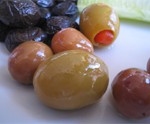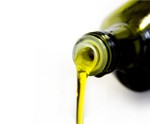Oliven werden in der Türkei vorallem an der Ägäis kultiviert.
Diese Region verwendet auch das Olivenöl traditionell in der türkischen Küche.In der Türkei gibt es Oliven in den Farben grün, lila und schwarz. Ein Teil dieser Oliven wird zu Olivenöl gepresst.
Oliven schmecken, da es sehr viele verschiedene Sorten gibt, alle unterschiedlich von mildem Geschmack bis kräftig ist alles möglich.
Nährstoffe und Inhaltsstoffe
Olivenöl besteht hauptsächlich aus Fetten, zu 90% aus ungesättigten Fetten, beim Olivenöl findet man vorwiegend die einfach ungesättigte Ölsäure.
Diese wird auch Omega 9 Fett genannt. Olivenöl enthält auch ca. 10% gesättigte Fettsäuren.
Vitamine und Mineralstoffe
Olivenöl enthält Vitamin A, hauptsächlich in der Form Beta-Carotin und sehr viel Vitamin E, Olivenöl ist reich an Vitamin E!
Ansonsten enthalten Olivenöle noch Vitamin K. Mineralstoffe sind in keinen nennenswerten Mengen enthalten, Spurenelemente auch nicht -Kupfer ist nur in geringen Mengen enthalten.
Olivenöl Gesundheit
Da Olivenöl einen hohen Anteil an ungesättigten Fettsäuren enthält, kann es einen wichtigen Beitrag für die Gesundheit leisten!
Beim Olivenöl handelt es sich hauptsächlich um einfach ungesättigte Fettsäuren der Ölsäure, auch Omega 9 Fettsäuren genannt.
Da viele Menschen zu viele Omega 6 Fette und zu wenig Omega 3 Fettsäuren über die Nahrung aufnehmen, kann ein Ungleichgewicht dieser Fettsäuren im Körper entstehen.
Die Ölsäure, bzw. Omega 9 kann diesem Prozess entgegensteuern, indem das Verhältnis der Fettsäuren Omega 3 zu Omega 6, positiv in Richtung Omega 3 verschoben wird!
Beim Kauf von Olivenöl soll man generell darauf achten, dass es sich um kaltgepresstes, natives Olivenöl handelt!
Türkische Küche - Verwendung
Olivenöl wird in der türkischen Küche hauptsächlich mit Gemüse serviert. Beim türkischen Olivenöl ist vorallem das kaltgepresste aus der Region Ägäis für Gourmets sehr zu empfehlen.
Die Oliven selbst werden in der türkischen Küche meist zum Frühstück und auch zum Salat serviert.
Olive are cultivated in Turkey especially on the Aegean region.
This region also uses the Olive Oil traditional in the Turkish Cuisine.In Turkey there are olives in green, purple and black. Some of them are pressed into olive oil.
Olive taste, since there are so many different varieties, all different from mild to strong flavors, everything is possible.
Nutrients and Ingredients
Olive oil is composed primarily of fats, 90% of unsaturated fats - In olive oil, the monounsaturated oleic acid is mainly found.
This is also called Omega 9 fat. Olive oil also contains about 10% saturated fatty acids.
Vitamins and Minerals
Olive oil contains vitamin A, mainly in the form of beta-carotene and a lot of vitamin E, olive oil is rich in vitamin E!
Otherwise, olive oils still contain vitamin K. Minerals are not present in any significant quantities, nor trace elements, copper is only present in small amounts.
Olive Oil Health
Since olive oil contains a high proportion of unsaturated fatty acids, it can make an important contribution to health!
Olive oil mostly contains monounsaturated fatty acids of oleic acid, also known as omega 9 fatty acids.
Since many people take too many omega 6 fats and not enough omega 3 fatty acids from the food, this can create an imbalance of these fatty acids in the body.
The oleic acid, and Omega 9 can counteract this process by moving the ratio of the fatty acids Omega 3 to Omega 6 in a positive direction to Omega 3!
When buying olive oil you should generally make sure that it is cold pressed, extra virgin olive oil!
Turkish Cuisine - Use
Olive oil is served mainly with vegetables in Turkish Cuisine. The Turkish olive oil, mainly the cold-pressed from the Aegean region is recommended for gourmets.
The olives themselves are served in Turkish Cuisine mostly for breakfast and with a salad.




